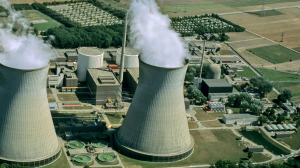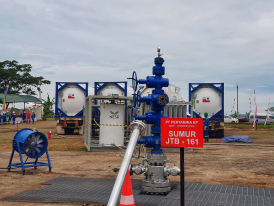ThorCon Power Indonesia submits proposal for Indonesia's first nuclear power plant
PT ThorCon Power Indonesia has officially submitted a proposal to the National Energy Council (DEN) to begin preparations for the implementation of the TMSR500 as Indonesia's first nuclear power plant (PLTN).
The proposal was crafted in collaboration with key stakeholders, including the Energy Strategy and Policy Research Agency (BBSP), the Directorate General of New, Renewable Energy and Energy Conservation (KEBTKE), the Ministry of Energy and Mineral Resources (ESDM), the Engineering Research and Innovation Center of the School of Engineering at Gadjah Mada University (UGM), PT PLN Enjiniring, and Bangka Belitung University (UBB).
Djoko Siswanto, Secretary-General of the National Energy Council, emphasized the critical nature of this strategic initiative in laying the groundwork for Indonesia's inaugural nuclear power plant.
He highlighted the urgency of the project, especially in light of recent discussions on nuclear energy led by Coordinating Minister for Maritime Affairs and Investment Luhut Binsar Pandjaitan.
Agus Puji Prasetyono, an academic representative on the National Energy Council and Chairman of the NEPIO Formation Acceleration Team, underscored the tight timeline for preparing the necessary documentation for the nuclear power plant's construction.
The first PLTN is expected to transmit electricity to PLN by 2032, a crucial deadline given the projected 2 GW electricity shortfall in Java by 2034 and a national deficit of 8-10 GW by 2040.
Agus emphasized that Indonesia's economic growth, driven by downstream processing and innovation, will require a strong and stable baseload energy source.
Given the limited potential for renewable energy baseloads in Indonesia, nuclear power is seen as the only viable solution to meet the country's substantial energy needs.
In his remarks, Agus expressed optimism that Indonesia would not only adopt imported nuclear technology, but could potentially become a provider of its own "PLTN Merah Putih" nuclear technology, exporting it to other countries in the future.
Bob S. Effendi, Director of Operations at PT ThorCon Power Indonesia, said that ThorCon Power is the most prepared company to build Indonesia's first nuclear power plant.
He noted that ThorCon Power has conducted extensive studies and is three years ahead of its competitors. In recent years, ThorCon Power has engaged in intensive consultations with the Nuclear Energy Regulatory Agency (BAPETEN) to prepare for licensing by reviewing safety, security, and safeguard (3S) measures and assessing the readiness of ThorCon's design. This process is expected to be completed by the end of this year.
ThorCon Power is committed to constructing the first nuclear power plant in Indonesia with a capacity of 2x250 MW (First-of-a-Kind/FOAK) without using state budget (APBN).
The company aims to achieve a commercial operation date (COD) by 2030 on Kelasa Island, Bangka Belitung, with a target electricity price of less than 6.9 US cents per kWh.
In the next phase, ThorCon Power plans to add seven additional nuclear units, equivalent to 3,500 MW (Nth-of-a-Kind/NOAK), with a target electricity price of less than 6.5 US cents per kWh and a COD before 2035.
This price includes waste management, decommissioning, and transmission to the nearest PLN Extra High Voltage Substation (GITET).
Bob added that with ThorCon Power's electricity price below Rp1,000 per kWh, the company has the potential to reduce electricity subsidies and compensation, which are projected to reach Rp100 trillion (US$6.4 billion) by 2030.
Through this initiative, ThorCon Power Indonesia aims to significantly contribute to increasing national energy capacity and meeting Indonesia's growing electricity demand.
The proposal's completion is expected to provide a strategic foundation for the government's decision-making process in establishing a legal framework for nuclear power plant development in Indonesia.
Looking ahead, PT ThorCon Power Indonesia aspires to become the first company to operate a nuclear power plant in Indonesia, offering an environmentally friendly and efficient energy solution while playing a vital role in the advancement of nuclear energy technology in the country.
Tag
Already have an account? Sign In
-
Start reading
Freemium
-
Monthly Subscription
20% OFF$29.75
$37.19/MonthCancel anytime
This offer is open to all new subscribers!
Subscribe now -
Yearly Subscription
33% OFF$228.13
$340.5/YearCancel anytime
This offer is open to all new subscribers!
Subscribe now






